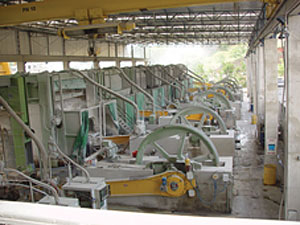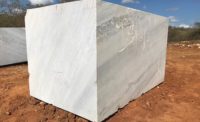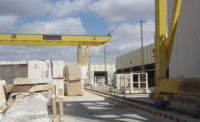
Established in 1968, Marbrasa Marmores e Granitos do
Brasil Ltda. of Cachoeiro de Itapemirim, Espírito Santo,
Brazil, has quarrying
operations throughout Brazil.
Pictured is the San Gabriel Black quarry.
Founded in 1968 by Camilo Cola, Marbrasa Marmores e Granitos do Brasil Ltda. of Cachoeiro de Itapemirim, Espírito Santo, Brazil, was one of the first Brazilian companies to produce stone on an international level. With a broad range of quarries and state-of-the-art production facilities, the company continues to export material to destinations around the world.
During its early days, Marbrasa focused on the domestic market in Brazil, and it developed a reputation for quality. Over the years, the company began exporting marble and granite in blocks, slabs and tiles to international customers. As the company’s worldwide reach expanded, it developed offices in China and the U.S. as well as partnerships in South America, Europe and Africa.
Approximately one-third of the company’s exports (33.5%) are shipped to the U.S., and other leading markets are Argentina (consuming 11.3% of exports), Colombia (9.6%), China (8.8%) and Venezuela (4.6%). The remaining 32.2% of exports are shipped to other nations.
Last year, Marbrasa opened an office in Miami, FL, to better serve the American market, with a toll-free customer service line. It typically sells to the leading importers and distributors in various regions across the U.S

Modern methods and technology are used for stone
extraction, and equipment in the quarries includes bulldozers, hammer drills
and diamond wire saws.
Stone production
Marbrasa operates a large number of quarries, mostly in the state of Espírito Santo. Granite quarries in the state include Arabesco, Creme Marfim, Juparana Imperial, New Venetian Gold, Labrador Green, Peacock Green, Graphite Brown and San Gabriel Black, while the company’s marble quarries in Espírito Santo are Cachoeiro White, Classic Veined White and Tropical Blue.Additionally, Marbrasa quarries Gaya quartzite in the Brazilian state of Bahia and Via Lactea granite in Minas Gerais.
Modern methods and technology are used for stone extraction, and equipment in the quarries includes bulldozers, hammer drills and diamond wire saws. Marbrasa’s quarrying philosophy is to use the highest level of technology in order to produce the best quality blocks.
A total of 300 workers are employed in quarries, and the combined production is more than 4,000 cubic meters per month.

Most of Marbrasa’s quarries are in the state of
Espírito Santo, including the site for Creme Marfim granite.
The equipment in use at the plant was brought in from Italy, and it includes eight gangsaws, two automated polishers and one complete line for cut-to-size production. Marbrasa’s factory produces between 150 and 200 containers per month, and it employs 300 people. Overall capacity is approximately 7,750,080 square feet (720,000 square meters) per year, and the company expects to increase to a total of 10,764,000 square feet (1,000,000 square meters) this year.
In terms of production, a total of 70% of Marbrasa’s business is slabs, with 25% being blocks and 5% tiles. The company’s sales strategy for this year is to improve its presence in new and inactive markets.

Marbrasa’s factory in Cachoeiro de Itapemirim sits on
an area of nearly 550,000 square feet (50,000 square meters), and it employs
300 workers.

A large inventory of blocks is maintained at
Marbrasa’s facilities.

The equipment at the factory was brought in from
Italy, and it includes eight gangsaws.

Marbrasa’s materials are well suited for a wide
variety of kitchen designs, including this modern application of Graphite
Brown.

In this kitchen design above, Marbrasa’s Creme Marfim
granite complements the rich woodwork.

San Gabriel Black from Marbrasa adds a defining touch
to this contemporary kitchen space.




